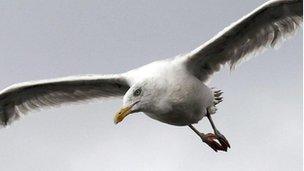Bath MP calls for urban gull research fund
- Published

MP Don Foster has said current methods to curb gull numbers are failing
Further research is needed to curb gull populations in towns, an MP has said.
Bath MP Don Foster made the call after he organised a "seagull summit" for local authorities affected by the problem.
A study carried out by Bristol University in 2010 found an estimated 1,100 pairs in Bath, 2,500 in Bristol and 2,900 in Gloucester.
The MP has called for a research fund to be created which would be supported by UK councils.
'Oiling of eggs'
Mr Foster said: "What I am proposing with a group of MPs is that we go to each of the councils that are affected who are already spending millions on this.
"If they put a small amount in over a three-year period, then we can get this research done."
He added that he had already lobbied government for the past five years to fund the research but his efforts had failed.
The MP has also said government research into gull numbers showed there were about 30,000 breeding pairs in the country but Bristol University findings led by seagull expert Peter Rock had estimated a much higher figure of 100,000 pairs.
"We simply don't know very much - the vast majority of research that's been done has been done on wild gulls living on cliff tops and so on.
"We've got very little on urban gulls and they are growing in number," explained Mr Foster.
"Despite all of the methods - everything from putting spikes on top of buildings, loud noises, bird scarers, oiling of eggs - none of them have worked and that's predominantly because we don't know enough about urban seagulls."
A Defra spokeswoman said: "We recognise that urban gulls can cause problems in some areas, which is why government enables local authorities to take action where there are public health issues."